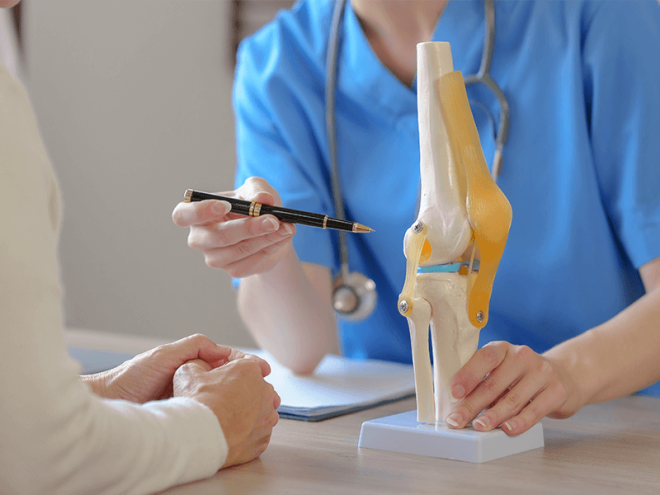
A knee infection is a medical condition affected by viruses, bacteria, fungi, or other microorganisms invading the knee joint. If the disease is not treated carefully, it can lead to inflammation and potentially severe implications. The Knee infection is referred to as specific or infectious arthritis and can be treated by an orthopedic surgeon. In this guide, we will understand more about knee infection, its causes, diagnosis, treatment, and disease of knee joint symptoms.
Infection In Knee Joint Symptoms
An infected knee joint is a serious condition that requires prompt medical management. For that reason, it is essential to be aware of potential symptoms. Infection in knee joint symptoms may include but are not limited to.
- Pain: One primary symptom is often severe knee joint pain, which may worsen with movement.
- Swelling: Significant swelling and warmth around the knee joint
- Redness: The skin over the knee joint may appear red or feel hot.
- Limited Range of Motion: Difficulty or inability to fully bend or straighten the knee.
- Fever: Systemic symptoms such as fever, chills, and fatigue may accompany the infection, mainly if it has spread beyond the knee joint.
- Fatigue: A generalized feeling of tiredness or malaise, often accompanied by other systemic symptoms, can be considered as an infection in knee joint symptoms.
Causes of Knee Infection
There are many causes of knee infections, including injury or attack by microorganisms. Here are a few discussed.
- Bacterial Infection: The most common cause of knee infections is bacteria, often entering the joint through direct trauma, surgery, or bloodstream from other infected areas (such as skin or urinary tract infections).
- Viral Infection: Viruses such as hepatitis B, hepatitis C, or HIV can also cause knee joint infections, although less commonly.
- Fungal Infection: Fungal organisms like Candida or Aspergillus may infect the knee joint, especially in immunocompromised individuals or those with a history of fungal infections.
- Other Microorganisms: Rarely parasites or atypical bacteria can also lead to knee joint infections.
If you have any symptoms, you should consult a doctor or orthopedic surgeon to avoid any mishap.
Types Of Knee Infections
Knee infections can vary widely in presentation, severity, and treatment approach. They are often categorized into several types based on their origin and the causative agents involved.
- Septic Arthritis: This is considered one of the most common types of knee infections, occurring when bacteria or other infectious agents invade the joint space. Typically, bacteria from an infection elsewhere in the body can spread through the bloodstream (hematogenous spread) and settle in the knee joint, causing inflammation and pain. The knee becomes swollen, warm to the touch, and extremely painful, often limiting mobility. In severe cases, septic arthritis can lead to rapid joint destruction and systemic infection if not promptly treated. Diagnosis involves a joint aspiration to analyze the fluid for bacteria and other signs of illness, followed by antibiotic therapy tailored to the identified pathogen.
- Osteomyelitis: Another common significant type of knee infection is osteomyelitis, where bacteria infect the bone itself. This condition can develop from a previous infection that spreads into the bone tissue or as a complication of surgery or trauma. Osteomyelitis of the knee presents with persistent pain, swelling, and sometimes fever. Diagnosis typically involves imaging studies such as MRI or bone scans to detect bone involvement, blood tests, and sometimes bone biopsy to identify the causative organism. Treatment often requires prolonged courses of intravenous antibiotics and occasionally surgical debridement to remove infected tissue.
- Soft tissues: Knee infections, such as cellulitis or abscesses, can arise from soft tissue infections around the knee. These infections usually result from breaks in the skin, surgical wounds, or injection sites that become contaminated with bacteria. Symptoms include localized redness, warmth, swelling, and pain, often accompanied by fever in more severe cases. Diagnosis involves:
- Clinical examination.
- Imaging studies if deeper structures are involved.
- Microbiological analysis of any wound or abscess drainage.
Treatment involves antibiotics and, in some cases, drainage of abscesses or surgical debridement to remove infected tissue and promote healing.
- Prosthetic Knee Infection: These infections are a specific concern in patients who have undergone knee replacement surgery. These infections can be particularly challenging to treat due to the presence of artificial materials and biofilms that bacteria can form on prosthetic surfaces. Symptoms may include pain, swelling, warmth, and sometimes drainage from the surgical site. Diagnosis requires joint aspiration and imaging studies to evaluate the extent of infection around the prosthesis. Treatment often involves a combination of antibiotics and surgical intervention, such as debridement, implant retention with antibiotic therapy, or, in severe cases, removal of the infected prosthesis followed by delayed re-implantation once the infection is controlled.
Get The Best Treatment, Care, And Diagnosis For Knee Infection Surgery From Dr. Simon Thomas
Dr. Simon Thomas is the best knee replacement and knee infection treatment surgeon in Delhi. With more than ten years of experience, our team is dedicated to providing the best knee infection treatment and care. We are the first choice of all looking to get relief from the infection in knee joint symptoms. We follow proper diagnosis and treatment care to provide you with the best-required results and treatment.
-
Diagnosis
Upon seeking medical attention, our healthcare provider or expert will perform a thorough evaluation, including the following.
- Physical Examination: A physical examination assesses the knee for signs of inflammation, warmth, tenderness, and range of motion.
- Imaging Tests: X-rays or MRI scans may be ordered to visualize the knee joint and detect any structural abnormalities or signs of infection.
- Joint Aspiration (Arthrocentesis): A procedure where a needle is inserted into the knee joint to withdraw fluid for analysis.
- Blood Tests: Blood tests are performed to examine the white blood cell count (which indicates infection) and other markers of inflammation.
-
Specialization and Experience
We are a team of highly experienced orthopedic surgeons who specialize in joint infections or have extensive experience treating complex knee infections. Our team and doctors are board-certified and have attained fellowship training in infectious diseases or joint reconstruction, which is a mark of specialized and skilled treatment and services.
-
Hospital Affiliation
We are honored with the Delhi Star Award for our excellent service to the field of medical science, which makes us the first and one of the best choices for all looking for the best treatment and hospital for knee infections.
-
Referrals and Recommendations
We are recommended by primary care physicians, other healthcare professionals, or friends and family who have undergone similar procedures. Our testimonials and reviews are our services’ insights, showcasing the surgeon’s reputation and patient satisfaction.
Book your appointment today with the best knee infection surgeon in India.







